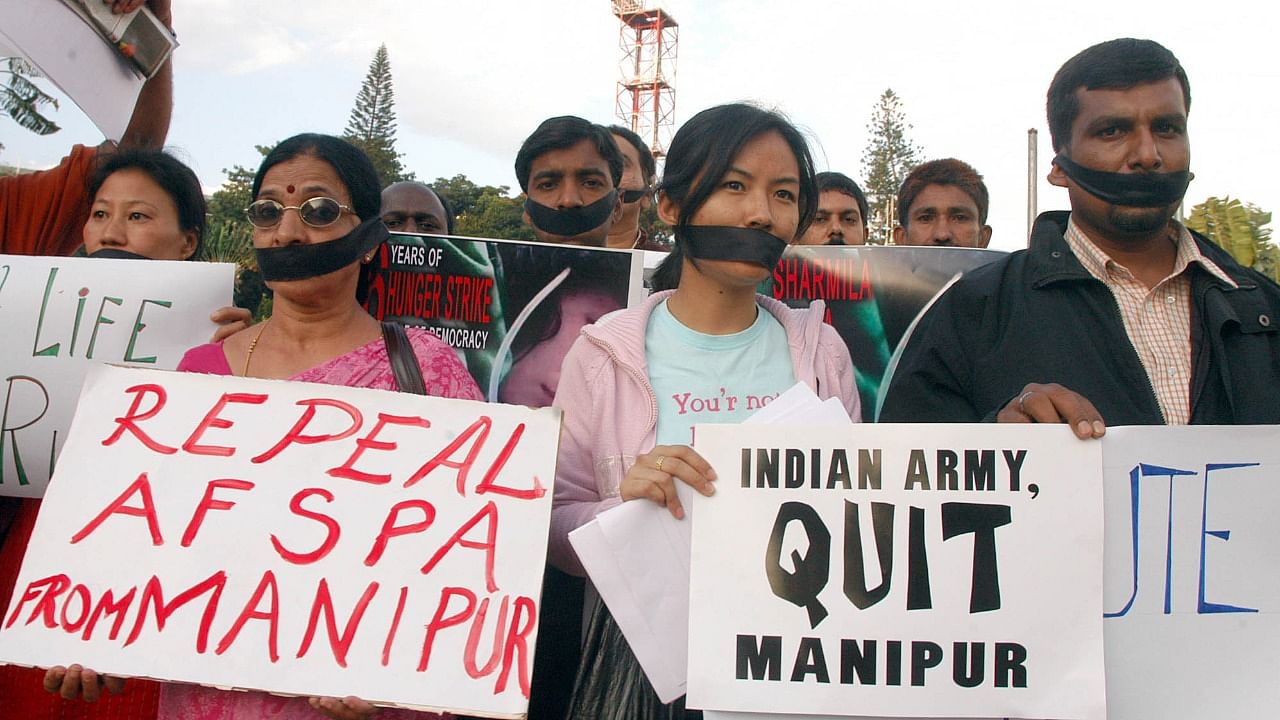
On the night of December 4, 14 civilians in Mon district of Nagaland were gunned down by army personnel in what officals have termed a case of 'mistaken identity' during 'counter insurgency' operations.
The first incident, in which six civilians were killed, occurred when Army personnel mistook coal mine workers returning home in a pick-up van on Saturday evening for insurgents belonging to the Yung Aung faction of the banned outfit NSCN(K).
After the workers failed to reach their homes, villagers went to look for them and surrounded Army vehicles. In the ensuing clash, one soldier was killed and Army vehicles burnt. Soldiers were claimed to have fired in self-defence, killing seven more civilians.
Rioting spilt over into Sunday afternoon when angry mobs vandalised the offices of the Konyak Union, an influential group of the Nagas to which the victims belonged, and an Assam Rifles camp in the area.
At least one more person was killed as security forces repulsed the attackers.
The horrifying incident brought the spotlight back on the Armed Forces (Special Powers) Act, 1958, which gives the armed forces powers to open fire, execute searches and take persons into custody in designated areas, and its repeal.
Where is the Armed Forces (Special Powers) Act currently in place?
At present, the act, colloquially called AFSPA, is in effect in Nagaland, Assam, Manipur (excluding parts of Imphal) and parts of Arunachal Pradesh in the northeast. The act was also enacted in Jammu and Kashmir under the Armed Forces (Jammu and Kashmir) Special Powers Act of 1990.
The Central government has enacted AFSPA in these states as it considers them to be "disturbed" areas, where there is a threat to peace and possible insurgency, due to which army personnel are deputed to aid civilians.
The law has been repealed in states where insurgencies have subsided, and where governments are able to manage the region using the police force. Thus, AFSPA was repealed in Tripura in 2015, and in Meghalaya in 2018, while its use was also restricted in Arunachal Pradesh.
Also Read — Army made no attempt to identify civilians before shooting, tried to 'hide' bodies: Report
Call for repeal: Why has AFSPA been widely condemned?
However, the act has received flak over the years due to various alleged crimes that range from crime against women to exploitation of locals for personal gain due to the unprecedented powers granted by the act. Various allegations of corruption have also surfaced over the years, with several politicians also terming the law "draconian" in nature.
The Jeevan Reddy Committee formed in 2004 had also recommended a complete repeal of the law. “The Act is a symbol of hate, oppression and an instrument of high handedness,” the body said, as reported by The Indian Express.
Among the most infamous incidents was the Malom massacre of 2000 in Manipur, in which 10 civilians were gunned down, following which Irom Sharmila, one of the biggest campaigners against the act, had started a hunger strike, for which she was arrested on the grounds of committing a "suicide attempt."
There was also an incident of rape and murder of a woman, allegedly by a group of Assam Rifles men, in 2004 in Manipur, which sparked outrage and public outcry against the act.
Nagaland incident
According to an FIR registered at the Tizit Police Station, the Army was booked under sections 302 (murder), 307 (attempt to murder) and 34 (common intention) of the Indian Penal Code, with commandos opening fire "without any provocation," as reported by the Times of India.
Nagaland Chief Minister Neiphiu Rio on Monday called for repealing the Armed Forces (Special Powers) Act (AFSPA), 1958, saying a democratic country like India should have no place for such a "draconian law."
"The state government has told the Centre that we don't the AFSPA. This is a draconian law. A democratic country should have no place for such a draconian law. We have a lot of other acts to handle law and order issues," Rio told reporters after taking part in the funeral of 14 villagers.
"The AFSPA is in force for more than 60 years now citing law and order issue. The state cabinet recommended for its withdrawal as the underground groups are in ceasefire for 25 years now and is engaged in talks. But the Centre declares the state as a disturbed area from time to time and refuses to withdraw AFSPA," Rio told the crowd.
NSCN-IM and NNPG, the rebel groups in ceasefire on Sunday said security forces were resorting to such killings and harassment of innocent civilians taking advantage of the AFSPA.
"AFSPA is the main culprit. This is the key element which has bred animosity. It has done nothing good. It is detrimental to national interest and with such Acts, these kind of incidents will continue to happen. This single Act has given too power to the armed forces to commit atrocities on their own people. A debate is ongoing for the past 60 years on this. This must go to ensure that there is no recurrence of such incidents," KG Kenye, senior MP from Nagaland in Rajya Sabha, told DH.
Army officials often stress that some special power is required to control "unwanted situation" created by militant groups in the Northeast, which operates allegedly with the the aid of "external forces.
It is worthy to note that the BJP is an ally of the government in Nagaland.
(With agency inputs)
Watch the latest DH Videos here: